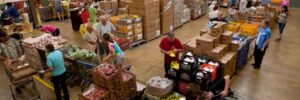Food insecurity affects the town of Carlisle even though it is located in one of the richest counties in the state of Pennsylvania. Northern Carlisle has been labeled as a “food desert” (Halpin, 2024). This means, in areas of town, it is difficult to buy affordable and quality food. Government initiatives to expand food access have historically involved intense barriers to entry. For various reasons, SNAP benefits don’t reach families who need support with food access. For example, among families that qualify according to the government standards, there is a lengthy application process and inherent stigma built into actually one day receiving the aid. Further, government metrics for determining food access needs may not reflect the actual circumstances of families (Hossfeld, 2018). While government initiatives toward providing food access are the most broadly effective and resourceful programs, local initiatives play a crucial role in bridging the gap where nationwide initiatives otherwise fail.
Local food access initiative demand is filled by neighborhood food pantries that exist to serve their respective communities. Food secure individuals fall under, “all persons obtaining at all times an affordable, nutritious and culturally appropriate diet through local, non-emergency food sources (or through normal economic channels)” (US Congress, n.d.). Food pantries tend to fulfill a greater number of characteristics of food security where broader initiatives can’t possibly cater as closely to communities’ needs.

Community members receive food from Project SHARE food pantry’s main location in Carlisle, PA (Project SHARE).
In Carlisle, a spit from Dickinson College’s campus, there is a local food pantry called Project SHARE that serves the Carlisle community directly. There, free, nutritious, and culturally catered food is provided to residents that need the support. For example, I saw they had Halal meat and some culturally specific items on the shelves. In terms of nutrition, there is a section for fruits and vegetables. One of the greatest barriers families may face when attempting to come off benefits is bridging the gap between being qualified and being self-sufficient with their income. Oftentimes income isn’t representative of need. Representative of Project SHARE related that their fruit and vegetable only serve families determined to be sufficiently below the poverty level (Project SHARE). Here, local initiatives for access shine once again. At Project SHARE, a farm stand is operated in order to serve families in any financial standing. No questions asked, families can acquire produce each month.
Sources:
Halpin, J. (2024). Local Issues and Initiatives in Food Access. Personal Collection of J. Halpin, Dickinson College, Carlisle, Pa.
Hossfeld, L. H., Kelly, E. B., & Waity, J. F. (Eds.). (2018). Food and Poverty: Food Insecurity and Food Sovereignty among America’s Poor. Vanderbilt University Press. https://doi.org/10.2307/j.ctv167585f
Project SHARE. (n.d.). Farmstand. Retrieved from https://projectsharepa.org/farm-stand/.